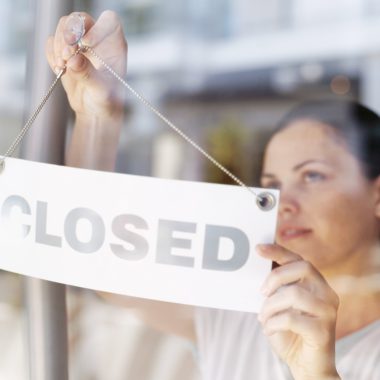The increased pressures on general practice mean that practices are closing at an ever-increasing rate – around 10% of GP practices in England are becoming vulnerable. But what can you do if you think that your practice is in danger?
1. Watch the pennies
Do you know what your cashflow is like? Do you have any financial projections? Make sure you have all this information to hand. If you realise that you are in fact skint, look at what caused this. Is there one particular partner or indeed the practice manager who has not been managing things properly? If so, get the blame game over quickly and try and sort things out.
Have a forensic look at all your expenses. Staff first – they are your biggest outgoing. Are you getting the best for them and, on the principle of subsidiarity, are they taking as much workload and responsibility as their training allows, from receptionist to salaried doctor?
Look at all the outgoings. It’s amazing what you may save on energy supplies, insurance cover, paper and toner and medical supplies. It may be worth joining a buying organisation for long-term savings. Don’t forget to check that your partners and practice MDO cover is correct – that all the sessions you do are covered and, as important, that you are not paying to cover work you don’t do.
2. Talk to people
No-one wants to see practices failing.
Call the NHS England local office, your CCG and your LMC. They can offer advice and support to help you get back on track. You may be truly amazed at how the goodwill you have built up with employees that have moved around from Health Authorities to PCGs to PCTs to CCGs can be monetised.
Bank managers can also help – see if they can advise you on managing your cashflow or even, if you are in deep trouble, offer you a loan to tide you over.
3. Involve your staff
It’s up to you how much you share with your staff about your financial situation but they can help. Reassure them that they will still get paid, but tell them that you need all hands on deck to try and keep the practice viable. I always find that management by lunch works exceptionally well – a trip to Pizza Hut for lunch at £6 per head is an excellent and cost-effective way of boosting staff productivity.
4. Mobilise your patients
Do you have an effective patient participation group? If so, get them on side. If not, you can still mobilise your patients to help you. Patients are happy to help if you encourage them – when I was starting my practice in 1995 a patient did a midnight bike ride to raise money for me to buy the equipment I needed. The spirit is still there if you can tap into it. Get your patients writing to local councillors, the local paper and their MPs. Put up notices in the waiting room encouraging patients to do this and telling them how. They can help get the message out that general practice needs help and raise the money and/or political will to save the practice.
5. Sort out your premises
Obviously there is a limit to what you can do when finances are tight, but look critically at your building and mystery shop your telephones to avoid patients walking away at the worst possible time. I tend to get a friend to phone up and listen in on speakerphone – how are the phones answered? Is it all negatives (‘no we haven’t any appointments and you can’t be seen’)? Or is it positive (‘yes, we are busy today and the first routine appointment is on the 31st and if you are ill enough that you must be seen today for your health, Dr X could fit you in for a brief consultation for this emergency item at 12.34’)?
Look at the waiting room. A couple of leather sofas from DFS do wonders – and you won’t even have to start paying for them for a year.
When patients hear that a practice is vulnerable, they walk away. Making sure the practice still looks nice can go some way to keeping patients with you when times are tough.
Above all, keep to your practice ethos of offering excellence of clinical care with continuity of care of 60% or more for patients with ongoing problems. Your reputation will spread.
Dr Peter Swinyard is a GP in Swindon and chairman of the Family Doctor Association. This article is based on his talk at Pulse Live London last month.

















